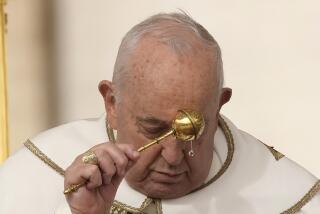Pope Speaks in Support of Croatia : Eastern Europe: The pontiff, visiting Hungary, also calls for international mediation to halt ethnic violence in Yugoslavia.
- Share via
PECS, Hungary — Reacting to an unexpected meeting at Mass here with a troubled Croatian cardinal, Pope John Paul II voiced support Saturday for Croatia’s search for self-determination and urged international mediation to defuse ethnic violence in Yugoslavia.
He also told hundreds of Croats among about 20,000 Hungarian pilgrims at an airport Mass that he hoped to visit Croatia soon.
Later, addressing the diplomatic community in Budapest, John Paul warmed to that theme. In the strongest speech of his weeklong swing through Poland and Hungary, he demanded “respect for the rights of all nations and of all minorities.”
“The minorities must accept the constitution of the country in which they live. Yet governments also owe them the recognition of equal rights, including the right to use their native language, the enjoyment of a just autonomy and preservation of their own culture,” the pontiff said. “If borders are inviolable, must we not likewise affirm that peoples themselves are inviolable?”
Without taking a position on their proclaimed declarations of independence, the Vatican supports self-determination through dialogue for the breakaway Yugoslav republics of Croatia and Slovenia, both of which are strongly Roman Catholic. It also backs European Community efforts to forge a peaceful settlement between Serbs and Croats. In Belgrade, the Serbian-controlled press has accused the Vatican of masterminding Croatia’s bid for secession.
Earlier this month, a Vatican peace mission had hoped to encourage dialogue between Catholic bishops in the two republics and their counterparts in the Orthodox church in Serbia.
Laying to rest historic ethnic hostilities in a Europe where the four-decade chasm between West and East has suddenly vanished “is a priority for Christians,” the Pope told the black-suited diplomats.
“They may not set it aside without being unfaithful to a central truth, that of the fundamental equality of all human beings who have been called to live in fraternal unity, beyond all sorts of borders,” he said.
Cardinal Franjo Kuharic of Zagreb and five bishops of a church hierarchy that has strongly endorsed independence for Croatia turned up Saturday as the Pope prepared for a Mass outside this city of 185,000 near the Yugoslav border.
Without prior notice, Kuharic and the bishops drove four hours from their embattled republic in hopes of conferring with John Paul, papal spokesman Joaquin Navarro told reporters at the Mass, celebrated before a sparse and dour crowd of Hungarian country folk and coal miners.
After hearing the Croats’ concerns, John Paul changed the greeting in Croatian prepared for delivery at the Mass, according to Navarro.
“I once more assure you that I am close to your legitimate aspirations. I renew my call to the international community to help in this difficult hour of your history. I trust that in the not-too-distant future I will be able to visit even with you,” John Paul told the Croatian prelates and pilgrims.
As the Pope prepared for Mass, among the worshipers waving Croatia’s red-and-white checkerboard flag in the morning sunshine stood Sister Maria Majovlic in a nun’s black habit.
“We hope the Pope will give us spiritual strength. What else can we poor Croats hope for? Today we are alive. Tomorrow, who knows?” she said in Italian.
In his address to the diplomats, John Paul exalted the possibilities for continental unity in Europe made possible by the collapse of communism. That theme has run through a trip that began in Poland last Tuesday, and it is the theme that will top the agenda at an unprecedented synod of bishops from all over Europe at the Vatican later this year.
“It is no longer a question of the play of opposing powers; it is a question of arriving at an increasingly close cooperation in what might be called ‘international freedom,’ an extension of the freedom recovered by individuals and peoples,” John Paul said.
With the sudden advent of democracy to Eastern Europe, this is the time for Europe to embrace Continental unity, the Pope believes.
“We are living in a historic hour for Europe. After many years of constraint and distrust, the barriers of an unnatural partition of the Continent have yielded before the real power of an authentic breakthrough of law, the rejection of injustice and a worthy recovery of freedom,” he said.
In his vision, the new, united Europe must be hewn from a foundation of shared Christian values rooted in continental history.
“From this day forward, will the different countries of the Continent which still bear fresh scars be able to re-establish a common life in which differences are accepted and disagreement overcome through adherence to the fundamental values received in their common heritage?” he asked the diplomats.
On his 52nd foreign trip as Pope, John Paul continues his rounds of the Hungarian countryside today before meeting this evening with representatives of Hungary’s Jewish community. He returns to Rome on Tuesday.
More to Read
Sign up for Essential California
The most important California stories and recommendations in your inbox every morning.
You may occasionally receive promotional content from the Los Angeles Times.










